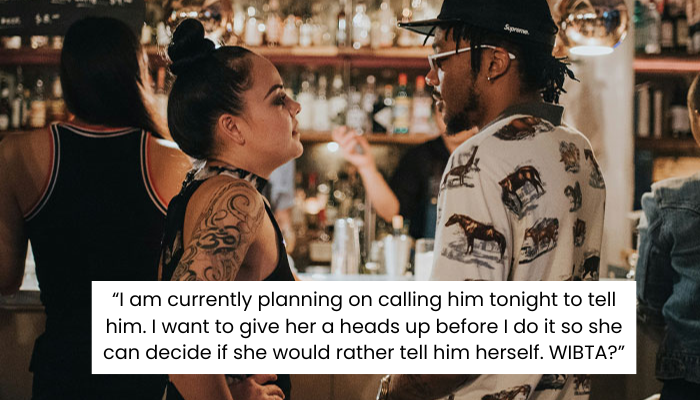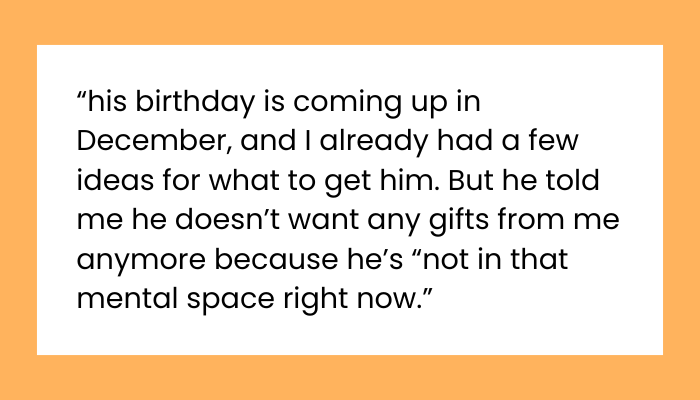Should I Tell My Best Friend’s Boyfriend She Cheated?
You’ve been best friends for 11 years. She’s in a long-term relationship (8 years) and they have kids together. Lately things have been rocky. During a night out, she told you she planned to break up, then ended up sleeping with someone she met at a bar. In the days since, she’s decided she wants to stay in the relationship, but insists she’ll keep what happened a secret — “taking it to the grave.”
You believe her boyfriend deserves to know. You hate the idea of him being betrayed, especially since she’s been cheated on before. Your gut tells you he should hear it; your heart worries about the cost — to your friendship, to their relationship, to the children. Now you’re planning to call him tonight and you want to give your friend a heads up. WIBTA?
Witnessing your best friend cheating on their partner creates a nightmare dilemma for you

A woman asked the internet for impartial advice on whether she should tell her BFF’s boyfriend that she recently had an affair






This is brutal — there’s no easy answer, and whichever path you take will cause pain. I’ll walk through the layers, the stakes, and what I think is “least bad.”
1. The emotional terrain: loyalty, betrayal, and who you owe
When someone confides in you — especially a best friend — there’s an implicit covenant of trust. You promised (implicitly or explicitly) to hold their vulnerabilities, mistakes, secrets. Breaking that is a kind of betrayal.
On the other hand, you see a different covenant: toward truth and fairness. If you believe in honesty, you feel complicit in betrayal by staying silent. Especially given the history: she’s been cheated on in the past. You empathize with how devastating that is.
You’re torn because two loyalties clash: loyalty to your friend, loyalty to moral integrity and to someone who is (right now) being deceived.
2. The argument for telling him
- He has a right to know: In a committed relationship, many people expect transparency. He may have the right to decide his future with full information.
- You can’t live with the lie: Carrying a secret that large can weigh heavily. You may fear being complicit in ongoing betrayal by silence.
- Precedent of honesty: She asked for secrecy because it’s easier, not because it’s fair. If mistakes are never acknowledged, trust never fully rebuilds.
- Your friend’s wishes may be self-serving: Saying “I’ll take it to the grave” might protect her, but it doesn’t protect him.
3. The argument against telling him
- Betrayal of trust: She confided in you with the expectation of privacy. She’s already in emotional agony; exposing this may crush her further.
- Risk of total collapse: They have children. Revealing this could shatter the family unit, with fallout impacting innocent parties.
- You are not the offender: You didn’t cheat. You’re, in a sense, stepping into a role you weren’t asked to play.
- Blame may shift to you: No matter how well you present it, he may see you as an interloper or villain.
- She may regret and want a chance to tell: She might be in shock, shame, pain. She might want a chance to confess on her own terms.
4. Timing, control, and how the news lands
How you deliver this matters hugely. If you simply call him with no warning, it’s a bombshell. It feels aggressive. If you talk to your friend first — “I’m going to tell him unless you do” — you give her agency, though still pushing her hand.

Also, context matters. If your friend is in emotional crisis, or they’re already struggling, this may push things over the edge.
You need to ask: is the relationship ripe for truth? Or will the revelation trigger irrevocable damage before any healing is possible?
5. Worst-case, middle and best-case outcomes
- Worst-case: The relationship ends. She never forgives you. The children lose a family. You become the enemy in their narrative.
- Middle: He confronts her, feelings are raw. They may separate or stay together with lots of pain, but communication opens up. You lose or severely strain your friendship, but clarity begins.
- Best-case: He accepts the truth, they decide to work through it, she owns her mistake, the relationship rebuilds stronger base of honesty. You maintain respect, even if trust is shaken.
6. Your moral “least bad” path
If it were me, I’d lean toward telling him — but carefully, compassionately, giving your friend one last chance. Here’s how:
- Talk to her first — say: “I’m struggling. I think he deserves to know. I’ll give you the chance to tell him yourself, but I may do it in X time.”
- Set conditions — give her a deadline. If she doesn’t act, you tell.
- Prepare your words — be calm, factual, gentle. Don’t add blame or speculation.
- Be there for both — after telling, you may be needed to support your friend, or to help them communicate. Don’t vanish.
- Respect their decisions — once told, how they act is no longer your responsibility. You own your piece.
7. The reality: you already told him
Given your update — you’ve done it — there’s no turning back. Now your focus is damage control and care.
- Own your role: Don’t pretend it wasn’t your choice. Be accountable.
- Don’t disappear: Support your friend emotionally, even when she’s angry at you (she may be).
- Listen more than argue: When you talk with him or her, let them speak. Don’t “defend yourself” aggressively.
- Encourage open dialogue: If both are open, help them talk — share what you know, but let them lead the healing.
- Take care of yourself: This is traumatic for you too. You may be hated, guilt-ridden, exhausted. Get support (friends, therapist).
8. Afterthoughts: are you the asshole?
Given the complexities, many would say NTA — you acted from compassion, honesty, not malice. But “not asshole” doesn’t mean a clean outcome. You walked into a moral storm, and everyone will feel hurt.
If your intentions were good, and you acted thoughtfully (not vindictively), that counts heavily. But also, you should expect consequences.

Most internet users thought the woman should definitely tell her friend’s boyfriend about what she did














